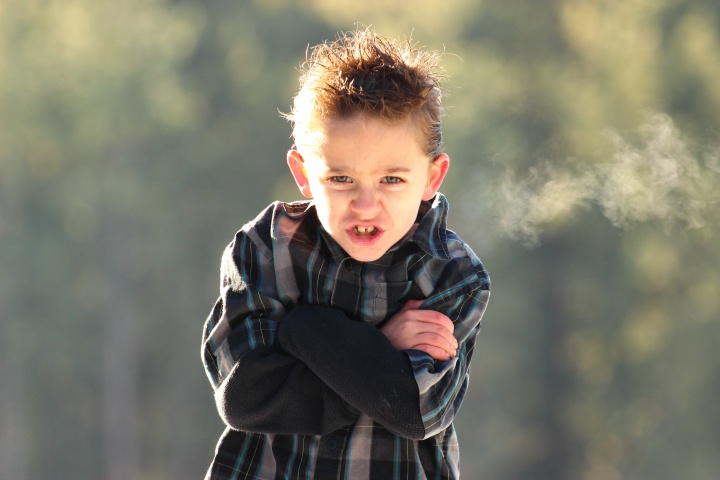We may have all gotten angry during the process of raising children. Sometimes it’s not because of how bad the child is, but because I’m tired, irritable, and upset. It just so happens that the child does something unsatisfactory, so it explodes.
What will happen to the children of parents who are irritable and easily out of control? How can we better control and manage our anger? Let me share this article.
01
Anger is an emotion
it’s not all negative
Anger is a natural emotion, and it’s not all negative.
For example, anger makes people feel powerful, that feeling of “going all out”. This kind of power may allow people to overcome fear and successfully complete some difficult things that they would not otherwise dare to do.
In addition, as parents, when we feel angry ourselves, we try to control and manage our anger reasonably. This is also a good example for our children, teaching by words and deeds.
For example, if we feel very angry about someone or something, but we try to take a deep breath or leave the angry situation instead of having a direct emotional outburst, this can allow children to learn how to better control their behavior.
However, anger is sometimes negative, especially when you are angry frequently and lose control after getting angry.
02
irritable parent
What will happen to the child?
Seeing parents getting angry, children may directly feel that it is their own problem or fault, and feel guilty. Parents’ anger can also make children feel stressed, which affects their brain development. Children who grow up in an irritable family environment are more likely to develop psychological problems in the future.
In addition, parents always get angry at their children and use hurtful language. Over time, the children will feel that they are bad and useless. These negative feelings and experiences directly affect children’s behavior and health.
For example, the child gradually becomes unable to concentrate, has difficulty getting along with other peers, becomes taciturn and timid, or becomes violent and aggressive, causing sleep problems, etc.
In addition, if parents lose control of their anger and use corporal punishment or abuse of their children, the consequences will be very serious.
Studies have found that corporal punishment increases children’s risk of antisocial behavior, strong aggression, low self-esteem, psychological problems, and negative relationships in the future.
In addition, if you attack a child in anger, the consequences may be disastrous if you lose control. For example, when an angry parent shakes a baby vigorously, it can lead to shaken baby syndrome, which can be fatal to the child. In addition, violent beating, kicking, throwing, throwing, etc. may cause serious personal injury to the child, and even cause death or disability.
We say that impulse is the devil, but in fact, anger can sometimes be like being possessed.
03
parenting process
Why do we get angry?
Raising a baby is not easy.
We often need various balances, such as dealing with various chores in life, doing housework, and handling work, while also playing and studying with us. When there are so many things in life and sometimes things don’t go so smoothly, we tend to lose patience and feel irritable or even angry.
In the process of raising children, disagreements between us and our teammates can easily lead to emotional outbursts, anger and irritability. For example, inconsistent parenting concepts, inconsistent educational concepts for children, and sometimes inconsistent arrangements for life affairs may cause anger. In the case of disagreement, when our efforts are denied, ignored, or underestimated by the other party, it is very easy to explode.
In addition, anger is “contagious”. Our children’s anger and frustration may make us feel angry too. For example, if a child gets angry and gets angry on purpose, we may become irritable and “fight back” against the child. Many parents may have experienced this situation, and they usually regret it afterwards.
In addition, physical discomfort, work or financial pressure, lack of sleep, the feeling of losing oneself, etc. These factors can also make us anxious and even angry during the parenting process.
04
as a parent
How do we deal with anger?
Anger cannot be completely avoided, but we can actually learn to manage it better. To put it simply, it can be divided into 3 steps.
first step
Know your own anger
When we are about to get angry, our bodies actually have “early signals” and it is important to recognize these signals. When you notice signs that you are about to get angry, remember to say it: I am angry, I am angry. Even if you are talking to yourself, talk about the angry situation at that time. For example, “You make me angry when you look like this.”
On early signs of anger:
Rapid heartbeat
rapid breathing
Shoulders become tight
Feeling tight and irritable
sweating
Make fists and grit your teeth
blushing
In addition, some negative thoughts in life can also lead us to anger step by step, or make our anger worse. Therefore, we must also stay vigilant about some negative thoughts.
For example,
I have been busy all day and my work is not going very well. When you get home and the house is in a mess, or the children are noisy and fighting, your bad mood may become more serious. Next, if the child refuses to do something and becomes tired and irritable, some negative thoughts will begin:
“I have to do everything, and no one can help me.”
“Why is this kid so careless?”
“If you be good, I won’t be so tired and angry.”
“Why do you always purposely piss me off?”
Once a thought starts to appear in our mind, we need to pay attention to it. We may need to stop and allow ourselves to slow down before the next step is to explode in anger.
Step 2
Learn to self-soothe and relax
As soon as you notice the early signs of anger or become aware of negative thoughts in your mind, remember to remind yourself that you need to calm down as much as possible.
If you can’t just walk away
If you leave your child alone, you can try:
Slow down your breathing.
Breathe in for 2 seconds and exhale for 4 seconds.
Try this over and over again until your heartbeat slows down.
If your child cries loudly and the crying is irritating, you can try temporarily plugging in earplugs or wearing a headset to temporarily block these irritating cries.
Also remember to breathe deeply and slowly.
If you can leave your children for a short time, you can try:
Do something that soothes you, such as listening to soothing music, reading your favorite book, or looking out the window.
Go outside for a walk or run a few laps.
Take a nice warm bath.
Talk to a friend or family member.
Make sure your children are safe when away from them. If someone can help, ask someone else to take care of the child while you try to relax.
Generally speaking, the heart rate slows down, the tension in the whole body is relieved, and the muscles relax. These are signs of relaxation and peace.
third step
Reflection and review
When your emotions calm down, you can actually review why you are angry. This review process can allow us to better avoid similar situations from occurring, and to better respond to similar situations when they occur. When reviewing the process, try asking yourself:
How serious is the matter?
Why am I having such an emotional reaction to this?
How do I want to handle this situation?
Is there anything I need to do about this situation?
Or should we just let things go?
05
Proper management of anger by parents
It is an example for children
It’s okay to feel angry, but it’s not okay to hurt your children or others because of your anger.
After getting angry, if you say to your child: “I’m sorry, mommy is angry with you,” it will make the child feel that the emotion of anger is wrong.
In fact, what we should say is: “I’m sorry, Mom yelled at you.” This will let the children understand that it is okay to feel angry occasionally, but they need to control and manage their anger in a good way.
Losing control and getting angry at the child, yelling at the child
What to do at this time?
There will always be times when we fail to control ourselves. We may get angry at our children, yell at them, or say something that we regret but should not say to our children.
Although you occasionally lose control and yell at your child, it will not immediately affect the child’s brain development. However, when you occasionally lose control, you can try telling your child:
I’m sorry, Mom/Dad lost control and lost his temper with you. I will pay attention next time and let myself go for a while and calm down before losing my temper with you.
I’m sorry, mom/dad yelled at you, let’s talk about what happened?
I’m sorry, those words are something mom/dad shouldn’t say, and you can’t say them when you’re angry. I should have known that I should leave for a while and talk to you again when I calmed down.
Peaceful emotions actually not only promote the parent-child relationship, but are also beneficial to the relationship between husband and wife. Every effort may help us better understand and manage our various emotions.
Raising a baby is not easy. You must remember to take good care of yourself so that you can take better care of your baby. No matter what the situation, don’t make it too difficult for yourself. If you find that no matter how hard you try, you find it difficult to calm down and frequently feel angry, anxious, sad, sad, etc., please remember to seek professional psychological support and help in a timely manner.




